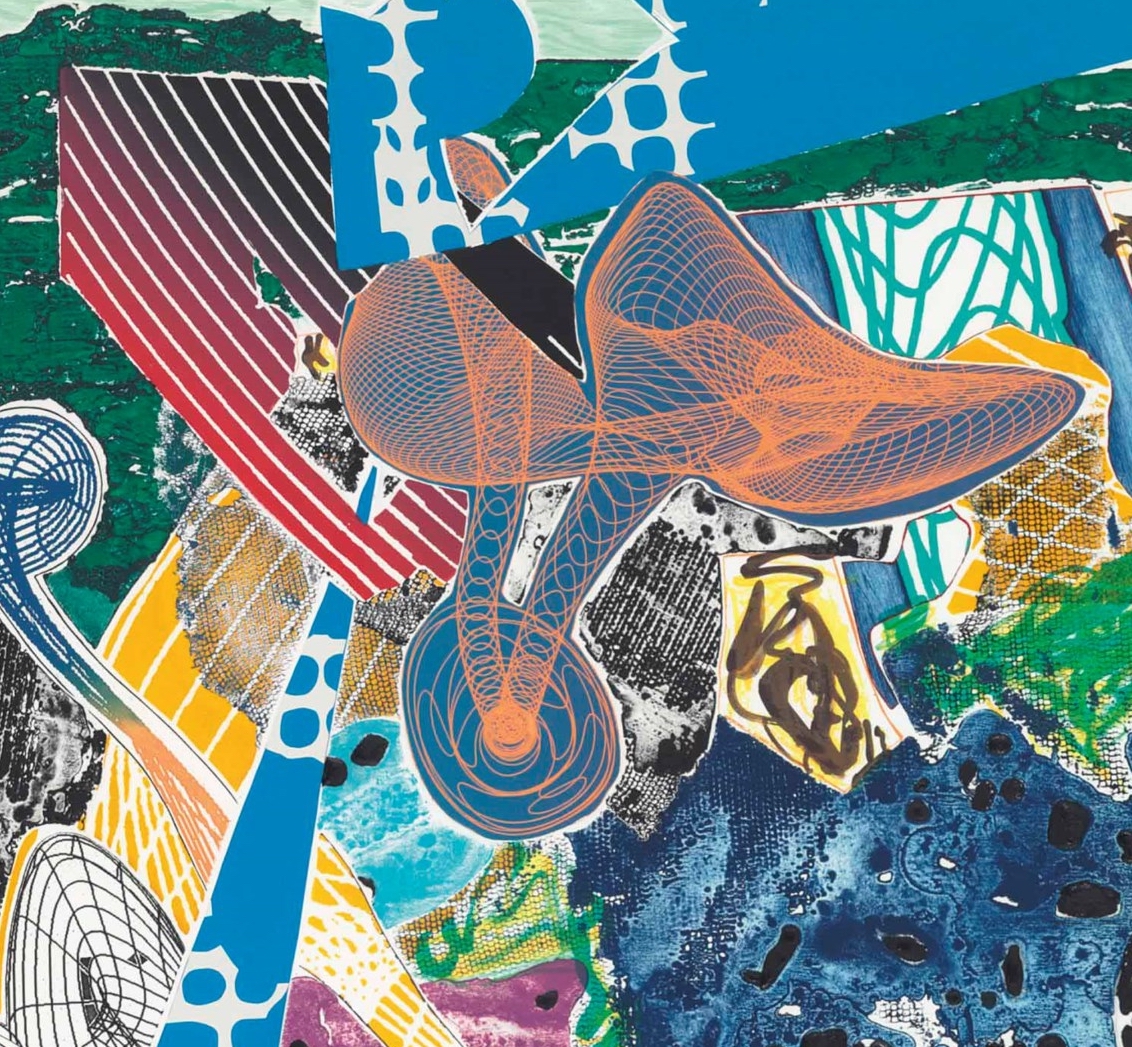
Behind almost every print and multiple that comes to market is a story of collaboration between the artist and master printer. This special, sometimes decades-long relationship couples the creative vision of an artist with the technical skill of a printer, allowing for the creation of something that neither could make on their own. For both modern and contemporary editions, these connections have illuminated the potential of the medium and elevated it to a level of prestige only previously reserved for painting and sculpture.
Discover four works from Artnet Auctions’ Contemporary Editions auction that exemplify how the partnership between artist and printer pushes the boundaries of what is possible within the realm of printmaking. The sale is now live for bidding until November 29.
Frank Stella, Swoonarie (from Imaginary Places) (1994)
Frank Stella, Swoonarie (from Imaginary Places) (1994). Est. $10,000–$15,000.
Frank Stella and legendary master printer Kenneth Tyler began working together as early as 1967 in Los Angeles. Stella’s Swoonarie print, from his “Imaginary Places” series, was created at Tyler Graphics. This printmaking studio and workshop was founded by Kenneth Tyler in Mount Kisco, New York, and was renowned for its collaboration with some of the most important artists of the 20th Century and the revival of printmaking as an art form in the 1970s and ’80s.
In the 1980s, Stella began to move away from his favored lithographic print medium and, with the help of Tyler, began to incorporate collage, paint, relief, handmade paper, and other techniques that can be seen in the “Imaginary Places” series. Swoonarie is a superb example of the potential of printmaking as a means of artistic expression: all the works in this series have a quality and complexity that had never previously been seen in prints. Without Kenneth Tyler, Stella would never have been introduced to these technological processes that he would go on to use in later paintings and sculptures.
Mel Bochner, HA HA HA (2021)
Mel Bochner, HA HA HA (2021). Est. $20,000–$30,000.
Mel Bochner has been working with the Soho-based publishing house Two Palms since its founding in 1994 by David Lasry. A one-time professor of Lasry’s, Bochner became Two Palms’ first collaborator after a chance encounter while passing the studio at the exact moment its first press was being delivered.
Since then, Bochner has gone on to produce over two hundred monoprints at Two Palms and even referred other artists like Terry Winters, Carrol Dunham, and Sol Lewitt to the publishing house. Two Palms has been known for developing innovative printmaking techniques that challenge the traditional definition of the medium, while still employing the skillful use of traditional techniques to inform their specialties. This can be seen through Bochner’s monoprints, where no two works are the same and the surface reveals unexpected outcomes with a variety of dense textures and rich hues.
John Chamberlain, Le Molé (1971)
John Chamberlain, Le Molé (1971). Est. $6,000–$8,000.
John Chamberlain only ever produced two pieces at Gemini G.E.L., with them being over 30 years apart from each other. The first was Le Molé in 1971, pictured here.
Founded in 1966, Gemini came to being during a fine art printmaking renaissance in America. Together Kenneth Tyler, Sidney Felsen, and Stanley Grinstein sought to create a space that nurtured the collaboration between artist and printer. As such, in the 1970s, the pace and diversity in production increased as Gemini printing explored beyond the central focus of lithography. Just a couple of years after its founding, Gemini G.E.L. became the premier West Coast destination for innovative printmaking, with a preeminent roster of artists that included Robert Rauschenberg, Jasper Johns, Roy Lichtenstein, and Ellsworth Kelly.
It was at this time that Chamberlain joined the ranks of artists interested in exploring the techniques and possibilities available to them at Gemini. To create Le Molé—an example of his “articulate wadding” body of work—Chamberlain dripped a crushed paper bag in polyester resin to create a mold that was then destroyed after production. Chamberlain’s style, usually synonymous with that of distorted metal, is ever-present here through a polished finish that is unique to each cast.
Pierre Soulages, Eau-forte V (1957)
Pierre Soulages, Eau-forte V (1957). Est. $10,000–$15,000.
Pierre Soulages was introduced to printmaking by Madeleine Lacourière, one of the printers of Atelier Lacourière along with her husband Roger Lacourière, who founded the workshop in 1929. Roger Lacourière worked extensively with artists such as Matisse in the 1920s and Picasso in the 1930s, popularizing the engraving technique among Modern artists in Paris.
In 1951, Madeleine saw Soulages’ paintings at Galerie Carré and sought him out to work together. At the Lacourière workshop, Soulages learned the principles of etching and aquatint and gained profound satisfaction in the etching process—particularly in allowing the acid bath to deepen his gestures in the copper plate. Prolonging the exposure of the copper plate to acid created holes in the plates, a result that excited the artist, who continued to experiment with eroding the plate to expose the original texture of the paper. Eau-forte V is a work that exemplifies this printing experimentation, with bold brushstrokes exploring the aesthetic realms of physicality and depth. The printers also taught him how to create silkscreens and lithographs, and Soulages found ways to imbue each process with his experimental approach and his eye for chance effects.
Contemporary Editions is now open for bids until November 29.